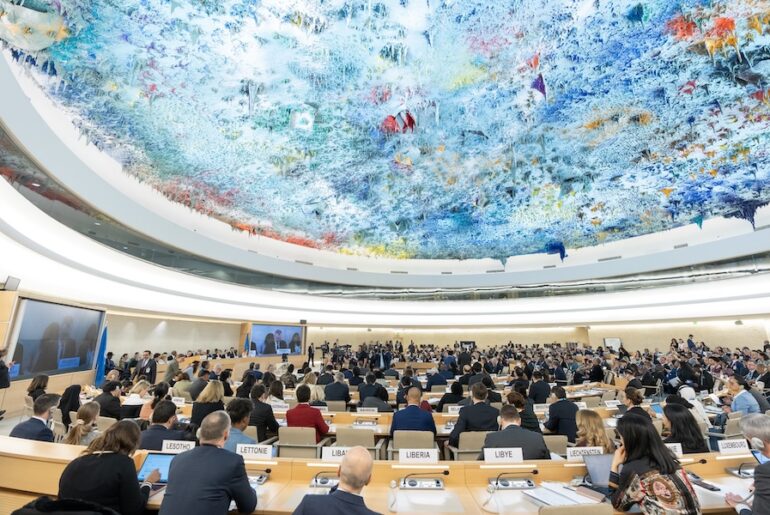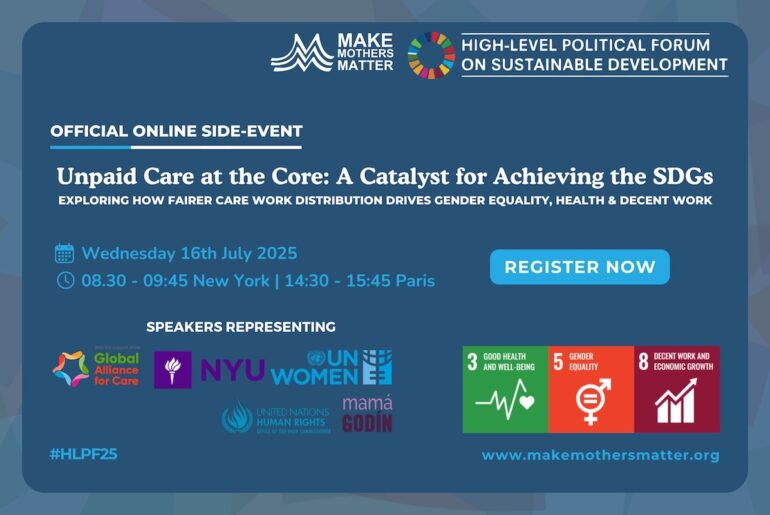Good laws and practices to advance care: MMM shares input
16.05.24
UN Geneva – In accordance with the resolution on the centrality of care and support from a human rights perspective, which was adopted by the Human Rights Council in October 2023, the Office of the High Commissioner for Human Rights issued a call for input into an expert workshop and a comprehensive thematic study on the human rights dimension of care and support. This was the opportunity for MMM to provide a mothers' perspective.

Our submission includes what we believe are significant developments at the global level, as well as examples of laws, policies and grassroots programmes that we consider good practices to advance the issue of Care and its inequitable distribution at the national and grassroots levels, illustrating the principle of co-responsibility that we defend.
At governmental level
- The 2013 International Conference of Labour Statisticians (ICLS) Resolution concerning statistics of work, employment and labour underutilisation de facto recognises unpaid care and domestic work as ‘productive work’, and mandates governments to include this work in national labour statistics. This resolution is important as it opens the way to granting unpaid carers rights similar to those of workers in formal employment, including basic social protection rights. In effect, this would mean disconnecting basic social protection from formal employment
- Ecuador’s 2008 Constitution establishes that “unpaid work of self-sustenance and caregiving, carried out in the home, is recognised as productive work”. And its Article 333 goes on to explicitly say what it concretely means: “The State shall strive towards a labour system that works in harmony with the needs for human caregiving and that facilitates convenient services, infrastructure, and work schedules; it shall, in particular, provide services for child care, care for persons with disabilities, and other services as needed for workers to be able to perform their activities; it shall furthermore foster the joint responsibility and reciprocity of men and women in domestic work and family obligations”
- For mothers, maternity protection is basic but key, both to preserve the health of the mother and her newborn, and to provide a minimum of job and income security. The International Labour Organisation’s Convention on Maternity Protection (no 183) is a good standard to protect mothers from dismissal and discrimination, ensure their right to resume work after leave, and maintain their wages and incomes during maternity leave… However, only 41% of women with new-borns receive maternity cash benefits that provide them with income security around childbirth. In particular, for women working in the informal sector, which is the case for the majority of women in most developing countries, maternity protection remains elusive.
The role of grassroots NGOs and the private sector
Although driven by governments, national care and support policies must also embrace the principle of co-responsibility and involve/support other stakeholders, notably the private sector and grassroots organisations working at the community level.
For example, governments should support Mothers Centres as promoted by our associate member MINE: these have a proven track record in empowering and connecting mothers to build caring communities across the world. The concept is simple: a Mothers Centre is a space, usually with a couple of rooms and a kitchen, where mothers can practice community parenting; share knowledge and challenges, relax, breathe, participate and embrace self-care. These are social and learning spaces created by mothers for mothers.
Grassroots programs promoting the involvement of men/fathers in caregiving to redistribute unpaid care and domestic work more fairly, also deserve support, as they have proven benefits for mothers, children and fathers alike. Examples of such programs include MenCare/Equimundo’s Programme P, which has been implemented in a dozen countries, or ACEV’s father support programs in Turkey .
National care and support policies should also directly or indirectly encourage the private sector to implement policies supporting parents and other employees with caregiving responsibilities. Such policy can include: flexible working arrangements, childcare support, emergency leave, adequate paid maternity/paternity/parental leave and support upon return. These policies bring many benefits, not only to mothers and other employed unpaid caregivers, but also to employers in terms of better talent acquisition and retention, as well as improved productivity and employee engagement.
Lastly, motherhood – and more generally parenthood and other unpaid caregiving work – is a learning experience that equips those unpaid caregivers with soft skills that include among others: planning and organisation, problem solving, active listening and empathy, crisis or conflict management, negotiating, leadership and decision-making skills… All these skills are very much in demand in the corporate world. Recognising and valuing them as part of a broader company’s policy to support employees with caregiving responsibilities, is a practical way of valuing their experience as unpaid carers. It also raises awareness of the synergies that exist between the personal and professional spheres.
Envisioning care as a common thread to global crises
29.07.24
UN New York - Our virtual HLPF side-event brought together experts to shed light on how the various global crises we face (in particular climate change and other environmental crises,
We call for multi-stakeholder approach to recognise and support unpaid care work
21.07.24
UN New York - Participating in the meeting of the UN Economic and Social Council (ECOSOC) on care and support systems, MMM reaffirmed the principle of co-responsibility, which should underpin
The New EU Gender Equality Roadmap : A Call for Inclusion of Mothers
04.03.25
The European Commission’s initiative on a new Gender Equality Roadmap post-2025, marks a significant step forward in addressing gender disparities across the European Union. Make Mothers Matter (MMM








